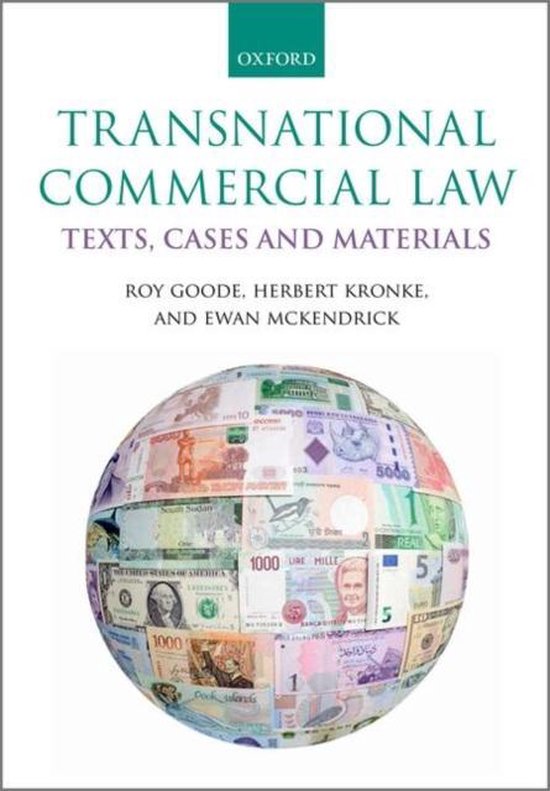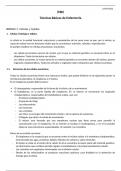Blue = Lecture
Red = Book
Week 1: Introduction to Commercial Law
Introduction to Commercial Law
1. Nature of Commercial Law
2. The historical development of transnational commercial law
3. Sources of (transnational) commercial law
Nature of Commercial Law
What drives commercial law? Where does it derive from?
- From the practices and needs of merchants to uphold their transactions as a result to
survive the business competitions on the one hand and also the need to overcome trade
impediments. These transactions should be wide spread, but then there are high costs
involved, so they have the incentive to uphold these transitions → Give rise to
commercial law
- Transnational commercial law consists of that set of rules, whatever source, which
governs international commercial transactions and is common to a number of legal
systems
- The purpose is to focus on the influences leading to the making of the instrument, its
objectives, scope and interpretation, the fundamental concepts it embodies, the key
policy questions it seeks to address and the methods used to reconcile the differing
viewpoints of different legal families and systems
- Commercial law is a response to the practices and legitimate needs of merchants
Example 1: Medieval
,Transportation of money to pay for goods was a hazardous enterprise. The vessel on which the
money was carried might sink or be seized by pirates. Banks settle accounts at one of the
international fairs or at a commercial center, avoiding risks on physical transportation.
Example 2: Modern
A creditor holding a portfolio of mortgage receivables would like to have taken off its balance
sheet to reduce its capital adequacy requirements. This can be achieved by Securitization (e.g.
selling the receivables to a SPV).
The American Uniform Commercial Code adopted an integrated approach to the more important
types of transactions. English Law has no commercial code and no formal separation of
commercial law from the general law.
The Nature of Commercial Law
Three definitions: (1) Commercial Law; (2) Transnational commercial law; (3) Lex Mercatoria
Commercial Law
- The totality of the law’s response to mercantile disputes, encompassing ‘all those
principles, rules and statutory provisions, of whatever kind and from whatever source,
which bear on the private law rights and obligations of parties to commercial
transactions’
- EXCLUDE: institutional law, consumer law and public law
Transnational Commercial Law
- Set of private law principles and rules, from whatever source, which governs
international commercial transactions and is common to legal systems generally or to a
significant number of legal systems
- Focus on private law and on transactions, particularly cross-border transactions
Three Concepts of Transnational Law
Three separate usages of the term ‘transnational law’
(1) As a general description of the legal regime of an international commercial transaction
(2) As a label for the factual uniformity or similarity in contract laws applicable to or
contractual patterns used in international commercial transactions
(3) As a term to denote international sources of commercial law, i.e. internationally uniform
law in the proper sense
1. All Law Pertaining to Transnational Transactions
- Transnational law in the broadest sense = All law which regulates actions or events that
transcend national frontiers
- Take into account the various legal environments and complex legal situations, which
might be relevant not only when drafting clauses on choice of law and forum, but also
when deciding on the time and manner of delivery and payment
, - These contractual provisions dealing with the transational situation might equally be
labeled ‘transnational law’ in so far as they constitute legally binding lex contractus
2. De Facto Uniform Law and Contractual Patterns
- Legal rules, principles and contractual patterns which are internationally used or
recognised in a uniform or similar way although they may stem partly from different
national laws
- Here, transnational law describes an actual uniformity or similar of rules and patterns
- Serving uniform needs of international business and economic cooperation
→ Labeled as Lex Mercatoria: As part of transnational commercial law which consists of the
unwritten customs and usages of merchants, so far as these satisfy certain externally set criteria
for validation
3. International Sources of Law; Uniform Law
- Based on international sources of law, i.e. either on conventions or on customary law
The nature of commercial law
- Body of law that governs commercial transactions
What are commercial transitions?
According to Roy goode, they are
- Arrangements and agreements between professionals for the provision and acquisition
of goods, services and facilities in the way of trade
- Commercial law is a law about professions, we are not dealing with consumers/ artificial
institutions like corporations, those are business forms. Commercial law deals with
transactions between (professional) merchants.
- Lex mercatoria, the law of the merchants
- Lex mercatoria as trade practices of the merchants and nothing else; commercial law isa
body of law that reacts to this kind of transactional practices among the professional
merchants, they do transactions such a way that it gets more efficient and need
validation by the court (development of trade)
- Validated legal norms reflecting the trade practices of the merchants
Civil law countries: Everything that is in the code is commercial law; has a stronger influence
from the States in terms of regulation and law-making; law-makers say this is commercial law
code
Commercial law could be anything that is transactional that relates to professional merchants
doing business. Do not treat commercial law code as commercial law and nothing else; if
something is not covered by the code, it does not mean that it is not commercial law. The matter
is: Whether you should look at commercial law from its essence.
4 Key Characteristics
Focus on
, Transactions
Dealings between merchants
Centered upon contracts and use of market
Large mass of transactions
Excluded from a commercial code
Law governing institutional structures
Consumer law
Legal obligations from non-contractual source
Occasional transactions with no need of standard treatment
What is to be put in a commercial code? Or essentially what is the so-called commercial
law? If commercial law can be broadly stated as the law that governs commercial
transactions, what are the key characteristics of the so-called commercial law?
In supra law jurisdictions, there is commercial law code. In anglo-american jurisdictions, there is
not.
If we don’t have the codes, what can we put in that code? What sort of law belongs to that
code? On the other hand, if we do have those codes, can we understand it as only transactions
involved can belong to the code while transactions under other law do not? What is essentially
commercial law?
Look at it from the negative prospective: See what is actually not commercial law! [see table]
- Commercial Law focuses on transactions; law that governs institutional structures → Is
that a transaction? No.
- Company law governs partnerships and corporations but not the transactions that
companies and partnerships do.
- Commercial law focuses on the dealings between merchants = govern the transitions
between merchants and consumers are more vulnerable, so consumers are not
professional merchants = consumers not included
- Commercial law also centered upon contracts and use of the market = legal obligations
from non contractual sources are excluded from commercial law code
- Commercial law focuses on large mass transitions; if the transactions only occur
occasionally then there is no need to have commercial codes for them











